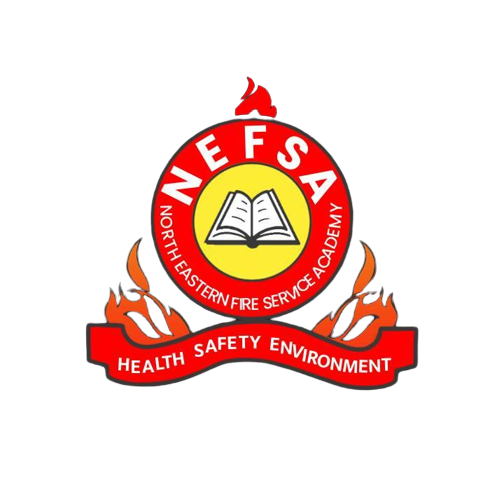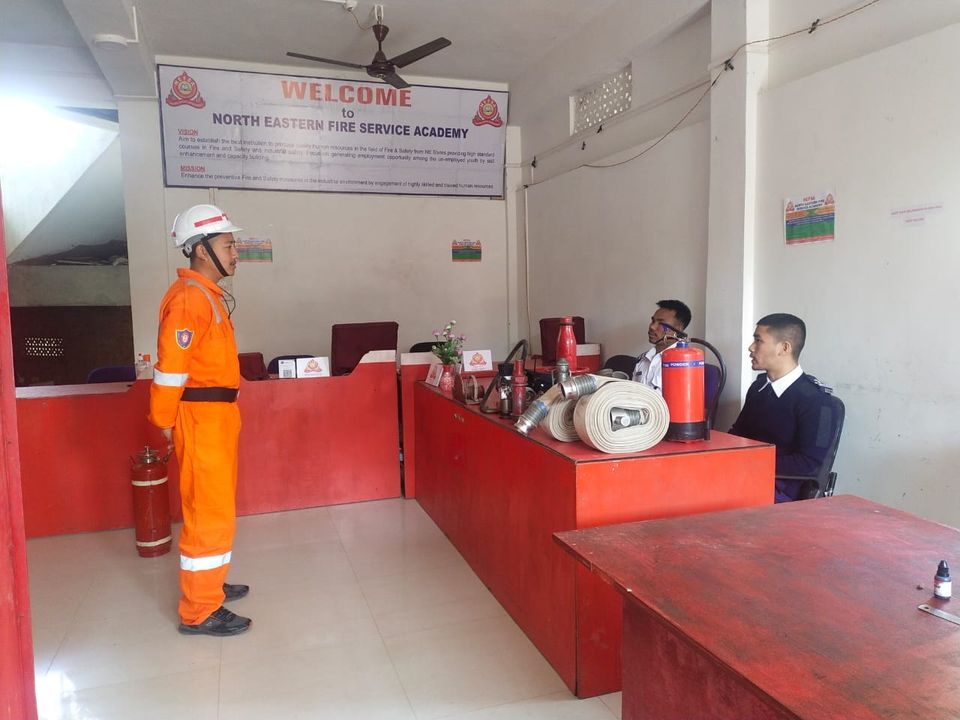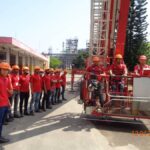Fire safety isn’t just about fire extinguishers and drills it’s a growing, specialised profession that protects lives, assets and reputations across industries. In India and worldwide, demand for trained fire safety professionals is rising because of expanding infrastructure, stricter regulations, and an increased focus on workplace and public safety. Below I explain the forces behind that demand, the most promising career paths, the skills employers want, and how NEFSA helps candidates step into these roles.
Why demand is rising?
-
Market growth for fire protection systems is strong. India’s fire protection / fire safety equipment market has been expanding at multi-percent CAGRs and is forecast to keep growing as industries and buildings adopt modern detection and suppression systems.
-
Regulatory pressure is increasing. The National Building Code (Part IV) and state-level fire-safety regulations require audits, fire NOCs and compliance measures that create sustained demand for inspectors, auditors and safety officers.
-
Workforce gaps and staffing shortages exist. Several Indian cities and agencies report large vacancies and manpower shortfalls in fire services, underlining an urgent need for trained personnel.
-
Global trend toward certification and training. International bodies and industry surveys show safety professionals are investing more in training and certification signalling employer preference for certified staff.
-
Steady career outlook in protective services. Occupational outlooks (e.g., fire inspectors and firefighters) predict continued demand and regular openings driven by replacement needs and expansion.
Key drivers in detail
1. Urbanisation, construction booms and industrial growth
New residential towers, malls, smart buildings, factories and data centres all require fire protection planning, system installation and ongoing maintenance which needs skilled engineers, installers and technicians. Market reports forecast multi-year growth in India’s fire protection sector.
2. Stronger regulation & compliance actions
National and state codes (NBC Part IV, building norms, and municipal fire NOC procedures) mandate fire safety audits, periodic inspections and certified fire plans tasks that need qualified fire safety auditors, consultants and officers. Non-compliance fines and reputational risk push organisations to hire experts.
3. Public safety awareness and corporate governance
High-profile fire incidents, insurance requirements and ESG priorities have motivated companies to invest in preventive measures and certified personnel (safety officers, fire engineers). Insurance underwriting also favours sites with certified safety staff.
4. Staffing shortages & career openings
Local news and government audits reveal vacancies in municipal fire services and contractual reliance for core posts opening pathways for trained entrants and contract-to-permanent roles.
5. Upskilling & certification trend
Industry bodies (e.g., NFPA and others) report an increase in training and certification uptake among safety professionals, which employers increasingly use as a filter for hiring.
Top career paths and what they pay ?
-
Firefighter / Fireman (Operational response) — frontline responders in civic or industrial fire brigades. (Outlook: steady growth in many regions.)
-
Fire Inspector / Fire Safety Officer / Fire Auditor — conduct audits, issue NOCs, inspect compliance. (BLS projects growth for inspectors in the coming decade.)
-
Fire Engineer / Fire Protection Engineer — design detection, suppression and smoke-control systems; often requires engineering background plus specialised certs.
-
Industrial Safety Officer / HSE Specialist (with fire focus) — combine occupational health & safety with fire prevention responsibilities.
-
Fire Systems Technician / Installer — install and maintain sprinklers, alarm systems and extinguishers.
-
Consultant / Risk Assessor — serve multiple clients for audits, NFPA/NBC compliance, and loss-prevention planning.
Note on pay: Salaries vary by role, city, sector (private industrial vs. municipal), and certifications. Certified and specialized fire engineers typically command higher packages than entry operational roles. Local salary surveys or job portals will give region-specific numbers.
Skills and qualifications employers want
-
Formal training & certifications: Fire safety diplomas, NFPA courses, NBC-aligned audit training, or government-recognised certificates.
-
Technical skills: Knowledge of sprinkler/hydrant systems, fire alarm systems, smoke control, passive fire protection, and building evacuation design.
-
Inspection & audit capability: Ability to run compliance audits and prepare fire safety plans and NOC dossiers.
-
Soft skills: Clear reporting, incident command basics, emergency planning, stakeholder communication.
-
Physical fitness and operational readiness: For firefighting roles endurance, drills, and live-scenario training.
How NEFSA prepares professionals?
NEFSA’s approach should (and can) include:
-
Integrated courses: Foundation + advanced tracks (firefighting, fire engineering, inspection & auditing, ARFF where relevant).
-
Hands-on drills & simulation: Live fire drills, hose drills, search & rescue, breathing apparatus training (these skills are non-negotiable for operational roles).
-
NBC & compliance modules: Practical training in preparing NOC applications, conducting audits to NBC Part IV standards, and documentation.
-
Placements & industry tie-ups: Partner with industries, airports, malls and municipal agencies to place skilled trainees into roles and internships.
-
Certification prep: Help students prepare for widely recognised certifications (national/state and international where applicable) an important differentiator for employers.
FAQs
Q: Is fire safety a stable career?
A: Yes , core public safety roles and compliance-driven corporate roles produce steady demand, with ongoing openings for replacements, expansion and compliance hiring.
Q: What qualifications do I need to become a fire inspector or safety officer?
A: Typically a diploma/degree in fire safety or engineering, plus certification in fire safety auditing, NBC compliance training or NFPA modules is highly valuable.
Q: Do industries hire private fire brigades?
A: Many large industrial plants, refineries, airports and some corporations maintain in-house brigades or contract private firefighting and safety teams; these require trained and certified staff.
Call to Action for NEFSA
If you’re ready to turn interest into impact, NEFSA’s hands-on fire safety courses combine practical drills, NBC-aligned auditing modules, and placement support.
Sources:-
Market growth of fire protection systems in India
-
-
“India Fire Protection System Market Size & Outlook, 2030” by Grand View Research shows that India’s fire protection system market generated revenue of USD 1,948 million in 2024 and is expected to reach USD 3,455.1 million by 2030. Grand View Research
-
“India Fire & Safety Equipment Market Size, Report, 2033” by IMARC Group shows the India fire & safety equipment market was valued at USD 1.89 billion in 2024 and projected to reach USD 3.01 billion by 2033. IMARC Group
-
“India Fire Protection Systems Market Size & Growth by 2033” by IMARC Group gives the India fire protection systems market as USD 2.3 billion in 2024, and the projection to USD 4.0 billion by 2033. IMARC Group
-
“India Fire Protection Systems Market in India 2025-2029” by Technavio forecasts a CAGR of 5.8% from 2024-2029, driven by stringent regulation. Technavio
-
Regulation / compliance – the code and legal background
-
-
“National Building Code of India 2016 Part 4 Fire & Life Safety (Volume 1 & Volume 2)” official document listing fire safety/building code requirements. fire.py.gov.in+2MPTownPlan+2
-
“Fire Safety Standards in India: A Complete Overview.” (TaxTMI) summarises how high-rise construction must comply with NBC codes and RWAs must coordinate with fire services. TaxTMI
-
“Ensuring Safety: A Comprehensive Look at NBC 2016 Part 4 Fire & Life Safety Audit.” (Elion) describes audits under NBC Part 4, emphasizing building safety & compliance. Energy & Safety Audit
-
Staffing shortages and workforce gaps
-
-
“City fire services on the brink with over 80% staff shortage” in Nagpur’s fire department. The Times of India
-
“Rapid urbanisation leading to more fire accidents. But Indian firefighters lack numbers, equipment.” (ThePrint) about manpower shortage across fire services in India. theprint.in
-
Contact us today to know more about admissions, batch schedules, and course details.
Visit: www.nefsaindia.com
Location: Dibrugarh, Assam
For More Blogs:- Click here







